Secretary of State John Kerry’s brief stop in Cairo last week was the first visit by a senior U.S. government official since the military takeover on July 3, and signaled the administration’s desire to work with the Egyptian government despite continued controversies over the partial suspension of U.S. assistance, the crackdown on the Muslim Brotherhood and Egypt’s democratic trajectory. Kent Davis-Packard talked with a wide range of Egyptians to uncover the nature of the wide gap in perspectives between them and Washington, and how it might be overcome. Dr. Davis-Packard is the recipient of an International Affairs Fellowship from the Council on Foreign Relations. She is currently living in Cairo conducting research on post-revolutionary politics there; she will be a visiting fellow this spring in the Saban Center for Middle East Policy at the Brookings Institution. Her dispatch is below.
Who Said Anything about “Democracy”?
Echoes of gunshots ricochet off the crumbling walls of Leila’s apartment in Manial, a normally quiet neighborhood in the heart of Cairo. Her Siamese cat dances along the windowsill, then dashes into the kitchen. Suddenly, children scream and men shout. Leila, a novelist, barely twitching an eyelash, mutters: “Aadi,” meaning “It is normal.” “We’re in our Arab Autumn.… We Egyptians don’t even use the term Arab Spring. We say revolution. Would it still be Spring, and are we allowed to say it was a revolution, if it did not bring democracy?”
Leila’s comments reveal a gulf separating Egyptians’ views of their current political dilemmas, and Washington’s. American officials consistently reference democracy as the guidepost for their policy toward Egypt, and as the aspiration of the Egyptian people. Again this weekend, Secretary of State John Kerry in Cairo said seeing “the progress we need on democracy” was the way to restore to Egypt the U.S. assistance currently being withheld.
In the wake of the January 25 revolution, U.S. officials and many observers assumed that the Egyptian people expected the democratic experience to address what matters most to them. But after the roller-coaster of the past two years, the term “democracy” has shifting meanings in the minds of Egypt’s politicians and the public. Interviews over the last two months with Egyptians from Cairo, Upper Egypt and Alexandria—from kiosk-stand owners and taxi drivers; to Egyptian businesswomen; to professors at Al-Azhar, the nation’s great Islamic university; to ultra-conservative Salafi party leaders—reveal a more complicated relationship with democracy.
According to Egyptian diplomats, the U.S. government’s recent announcement that it would withhold deliveries of some military equipment, and continued congressional holds on $260 million in cash aid, along with $60 million for an Egyptian-American Enterprise Fund, sparked more tension between Washington and Cairo than seen in years. But it’s not about the money, say Egyptian officials. What makes Egyptians most angry, several of them echoed, is not withholding assistance, but putting words into the mouths of the Egyptian people that are not theirs.
“What has democracy done?” lamented a cab driver, who said he would prefer Egypt to go back to the days of ousted President Hosni Mubarak. “People have died. We have more violence and no security.” For Egyptians like him, democracy was the process by which a government—the Muslim Brotherhood—was elected, failed and then was removed from power by a dramatic street uprising with the help of the military. They heard the West’s encouragement to turn back to the ballot box. But from the people’s perspective, the ballot box did not bring “bread, freedom and social justice”—their demands at Tahrir Square. Instead, it brought constant conflict, uncertainty and no relief from increasingly dire security and economic problems. Like two ships passing in the night, western leaders continue to call for democratic transition in Egypt—while Egyptians increasingly wonder whether democracy can really get them what they want.
For some, economic recovery is the key priority–not just as a goal in itself, but a means to an end. An Al-Azhar University professor of philosophy explained to me democracy is not at the top of some Egyptians’ “to do” list. “And what’s wrong with another Nasser?” she exclaimed. “If I can find a leader who can take Egypt into ‘tomorrow,’ I will sacrifice all of my rights. I am ready to forget everything about my own freedom for an Egypt that does not have to ask for handouts from the international community!” According to some Egyptians, the Muslim Brotherhood won the elections because they bought votes from the poor, not because they were fit to lead. Why were they able to do this? “Because there are many people here who do not have even enough bread to live,” said a political science student. Thus, economic hardship distorts democracy, rendering it more harmful than good.
To Egyptians who prioritize economic independence, economic assistance linked to democratization has come to signify a means of controlling Egypt and nothing more. An Al-Azhar professor of Islamic law stated: “The West isn’t interested in the peoples of the Orient. You cannot put Egypt under your arm just because you give us some dollars.” Thus, American rhetoric about resuming robust economic assistance when a democratically elected government is in office rings hollow.
For still others, democracy, and western advocacy of it, is seen as a cynical ploy, covering more parochial interests. Some Egyptians were disappointed at western governments’ reticence to criticize the elected Brotherhood when it took anti-democratic steps. A prominent women’s rights activist told me, “The international community does not support democracy or social justice. The relationship America had with the Muslim Brotherhood was political rather than in support of any democratic principles we actually believe in.” “What’s the big deal about democracy?” grumbled an American University in Cairo (AUC) political science student. “Do you think the American government really cares about democracy or the Egyptian people?”
Another reason America’s encouragement of democracy has low credibility in Egypt is because some strict interpretations of sharia law preclude western notions of democracy. While there are those who believe Sharia and democracy are compatible, ultra-conservative clerics, some of whom hold significant weight in Egyptian society, object. A leader of the Salafi Asala Party, for example, said: “While the principles of democracy are contained within Islam, there are fundamental differences between democracy and Islamic law, and Egypt must follow its own path according to Sharia law.” Oddly, given this view, Asala competed in the 2011-2012 parliamentary elections and held three seats until the parliament was dissolved by a court ruling.
To complicate matters further, Egyptians define democracy in varying ways that don’t necessarily hinge on formal political procedures but rather mean “outcomes that reflect the popular will.” One exasperated former diplomat and professor at AUC said: “I don’t know why we cannot get it across to the Americans that deposing Morsi was democratic. We collected signatures and the people demanded new elections!” Two Al-Azhar professors claimed that both the Nasser and Sadat regimes were examples of democratic governance, and that Abdel Fattah Al-Sisi—Egypt’s minister of defense and interim deputy prime minister—could continue this tradition. A student from a rural area told me that many Egyptians don’t even know the meaning of democracy: “They will accept whatever definition of democracy that is trending.”
Given the degree to which Egyptians themselves fail to agree on what democracy means and whether it would be good for them, it’s not surprising that some prioritize socioeconomic development over democratic governance. One physician and writer, believing sound economics influences a more educated populace able to make better choices for a democratic leader, affirmed he would prefer a benevolent dictator to what has been offered today. The Al-Azhar philosophy professor agreed that the groundwork has not been laid economically for the system to work without glitches. “Democracy needs people ready for its expression,” she explained. “We need five years of a strong Egypt to make Egypt calm and wise. After that, we can see about democracy.”
Given these Egyptian perspectives, the fact that Western countries, especially the United States, continue to push for democracy exacerbates Egyptian suspicions of U.S. motives and makes nationalism an ever-more powerful political force. The Egyptian government stands to benefit now from being seen by the population as heroically standing up against western power—especially if it is not exactly democratic itself. “The government uses the media,” said the physician and writer, “to misinform the Egyptian people by claiming the Americans support the Muslim Brotherhood and are hatching a plot with Israel. For their own purposes, the government plays on the conspiracy theories embedded in the Egyptian sub-conscious.”
Egyptian opposition to western pressure and a diminishing appreciation for democracy enables Egyptians to accept less than democracy while focusing on more material goals. The question is whether the international community can aid Egyptians in achieving their economic priorities, perhaps reducing the likelihood of a new “authoritarian bargain” and easing a path for Egyptian support for democratic politics. To some extent, this is already happening. “It’s not just money that contributes to development—it is sharing ideas, music, art and opening people’s minds to free-thinking and analysis. We really need experts to come to Egypt to tell us how to improve our educational system.”
According to a prominent woman activist, there is an educated, influential group of Egyptians who believe that “democracy is not separate from bread, freedom and social justice.” Then, she and many others I interviewed repeated a phrase that rang strangely familiar: “Democracy is more than the ballot box.” When U.S. officials say this, they usually mean democracy also involves values of equality, tolerance, compromise and civil rights. If democracy is not just the vote, but the means by which citizens determine policy directions that will advance what they see as their priorities, how might the United States help them achieve that goal? Perhaps Egypt and the United States are not just two ships passing in the night—especially since both sides agree that it takes more than the procedural elements to build a strong and credible democracy. Perhaps this shared value is a useful starting point for the two countries to lay the groundwork in Egypt for democracy to become meaningful.
The Brookings Institution is committed to quality, independence, and impact.
We are supported by a diverse array of funders. In line with our values and policies, each Brookings publication represents the sole views of its author(s).
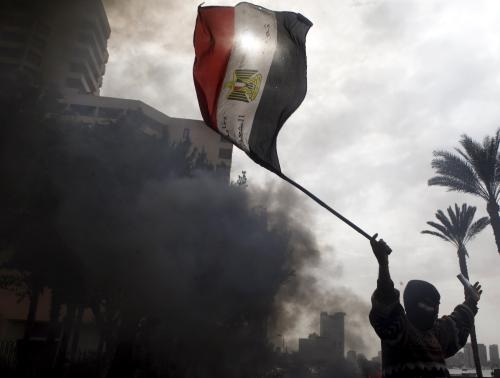
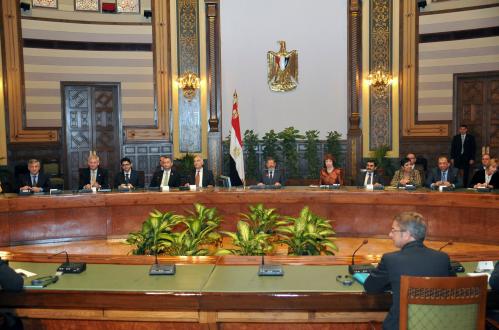

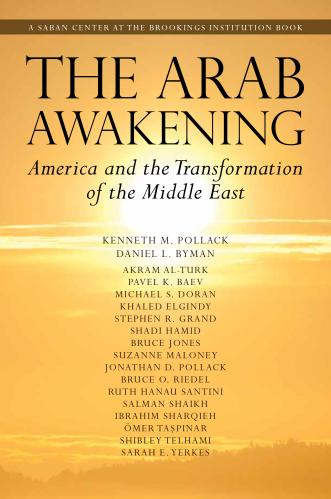
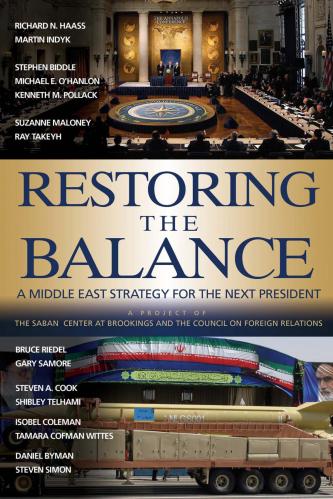
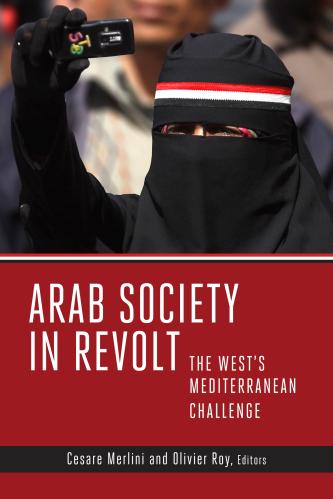



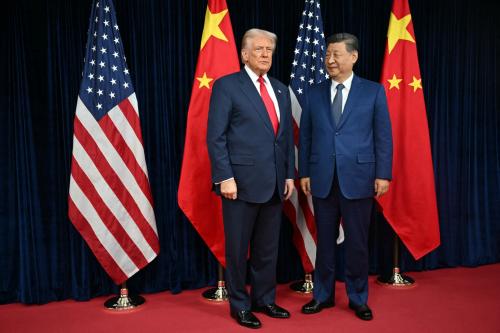
Commentary
Egypt, United States Differ on Meaning of Democracy
November 12, 2013